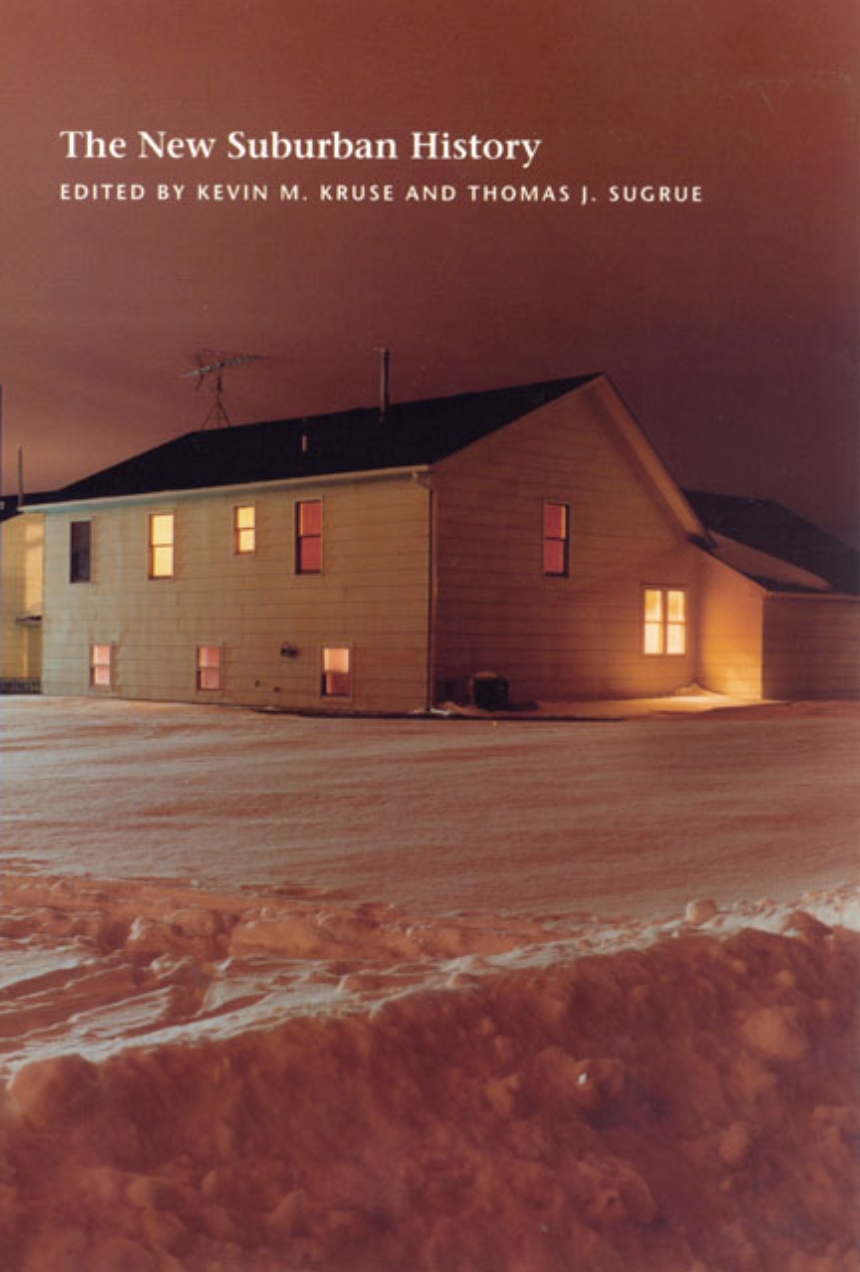The New Suburban History
America has become a nation of suburbs. Confronting the popular image of suburbia as simply a refuge for affluent whites, The New Suburban History rejects the stereotypes of a conformist and conflict-free suburbia. The seemingly calm streets of suburbia were, in fact, battlegrounds over race, class, and politics. With this collection, Kevin Kruse and Thomas Sugrue argue that suburbia must be understood as a central factor in the modern American experience.
Kruse and Sugrue here collect ten essays—augmented by their provocative introduction—that challenge our understanding of suburbia. Drawing from original research on suburbs across the country, the contributors recast important political and social issues in the context of suburbanization. Their essays reveal the role suburbs have played in the transformation of American liberalism and conservatism; the contentious politics of race, class, and ethnicity; and debates about the environment, land use, and taxation. The contributors move the history of African Americans, Latinos, Asians, and blue-collar workers from the margins to the mainstream of suburban history.
From this broad perspective, these innovative historians explore the way suburbs affect—and are affected by—central cities, competing suburbs, and entire regions. The results, they show, are far-reaching: the emergence of a suburban America has reshaped national politics, fostered new social movements, and remade the American landscape. The New Suburban History offers nothing less than a new American history—one that claims the nation cannot be fully understood without a history of American suburbs at its very center.
Kruse and Sugrue here collect ten essays—augmented by their provocative introduction—that challenge our understanding of suburbia. Drawing from original research on suburbs across the country, the contributors recast important political and social issues in the context of suburbanization. Their essays reveal the role suburbs have played in the transformation of American liberalism and conservatism; the contentious politics of race, class, and ethnicity; and debates about the environment, land use, and taxation. The contributors move the history of African Americans, Latinos, Asians, and blue-collar workers from the margins to the mainstream of suburban history.
From this broad perspective, these innovative historians explore the way suburbs affect—and are affected by—central cities, competing suburbs, and entire regions. The results, they show, are far-reaching: the emergence of a suburban America has reshaped national politics, fostered new social movements, and remade the American landscape. The New Suburban History offers nothing less than a new American history—one that claims the nation cannot be fully understood without a history of American suburbs at its very center.
300 pages | 12 halftones, 4 tables | 6 x 9 | © 2006
Historical Studies of Urban America
Economics and Business: Economics--Urban and Regional
Geography: Urban Geography
History: American History, Urban History
Political Science: Public Policy
Sociology: Social History, Urban and Rural Sociology
Reviews
Table of Contents
Acknowledgments
Introduction
The New Suburban History
Kevin M. Kruse and Thomas J. Sugrue
1. Marketing the Free Market: State Intervention and the Politics of Prosperity in Metropolitan America
David M. P. Freund
2. Less Than Plessy: The Inner City, Suburbs, and State-Sanctioned Residential Segregation in the Age of Brown
Arnold R. Hirsch
3. Uncovering the City in the Suburb: Cold War Politics, Scientific Elites, and High-Tech Spaces
Margaret Pugh O’Mara
4. How Hell Moved from the City to the Suburbs: Urban Scholars and Changing Perceptions of Authentic Community
Becky Nicolaides
5. “The House I Live In”: Race, Class, and African American Suburban Dreams in the Postwar United States
Andrew Wiese
6. “Socioeconomic Integration” in the Suburbs: From Reactionary Populism to Class Fairness in Metropolitan Charlotte
Introduction
The New Suburban History
Kevin M. Kruse and Thomas J. Sugrue
1. Marketing the Free Market: State Intervention and the Politics of Prosperity in Metropolitan America
David M. P. Freund
2. Less Than Plessy: The Inner City, Suburbs, and State-Sanctioned Residential Segregation in the Age of Brown
Arnold R. Hirsch
3. Uncovering the City in the Suburb: Cold War Politics, Scientific Elites, and High-Tech Spaces
Margaret Pugh O’Mara
4. How Hell Moved from the City to the Suburbs: Urban Scholars and Changing Perceptions of Authentic Community
Becky Nicolaides
5. “The House I Live In”: Race, Class, and African American Suburban Dreams in the Postwar United States
Andrew Wiese
6. “Socioeconomic Integration” in the Suburbs: From Reactionary Populism to Class Fairness in Metropolitan Charlotte
Matthew D. Lassiter
7. Prelude to the Tax Revolt: The Politics of the “Tax Dollar” in Postwar California
Robert O. Self
8. Suburban Growth and Its Discontents: The Logic and Limits of Reform on the Postwar Northeast Corridor
Peter Siskind
9. Reshaping the American Dream: Immigrants, Ethnic Minorities, and the Politics of the New Suburbs
Michael Jones-Correa
10. The Legal Technology of Exclusion in Metropolitan America
Gerald Frug
Notes
Contributors
Index
7. Prelude to the Tax Revolt: The Politics of the “Tax Dollar” in Postwar California
Robert O. Self
8. Suburban Growth and Its Discontents: The Logic and Limits of Reform on the Postwar Northeast Corridor
Peter Siskind
9. Reshaping the American Dream: Immigrants, Ethnic Minorities, and the Politics of the New Suburbs
Michael Jones-Correa
10. The Legal Technology of Exclusion in Metropolitan America
Gerald Frug
Notes
Contributors
Index
